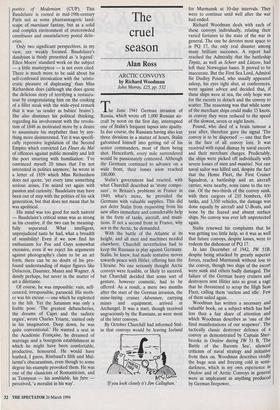The cruel season
Alan Ross
ARCTIC CONVOYS by Richard Woodman John Murray, £25, pp. 532 The June 1941 German invasion of Russia, which wrote off 1,000 Russian air- craft by noon on the first day, interrupted one of Stalin's frequent lapses into apathy. In due course, the Russians having also lost three divisions in a matter of hours, Stalin galvanised himself into getting rid of his senior commanders, most of them being shot. Henceforth, every mile surrendered would be passionately contested. Although the Germans continued to advance on a wide front, their losses soon reached 100,000.
Stalin's government had reacted, with what Churchill described as 'stony compo- sure', to Britain's problems in France in 1940; what's more, he provided the Germans with valuable supplies. This did not deter Stalin from requesting from his new allies immediate and considerable help in the form of tanks, aircraft, and muni- tions. If not a second front in France, why not in the Arctic, he demanded.
With the battle of the Atlantic at its height, and all men and machines needed elsewhere, Churchill nevertheless had to keep the Russians in play against Germany. Stalin, he knew, had made tentative moves towards peace with Hitler, offering him the Ukraine. No one seriously thought Arctic convoys were feasible, or likely to succeed, but Churchill decided that some sort of gesture, however cosmetic, had to be offered. As a result, a mere two months after the start of the German invasion, the mine-laying cruiser Adventure, carrying mines and equipment, arrived at Archangel. It was a start, though received ungraciously by the Russians, as were most of the later convoys.
By October Churchill had informed Stal- in that convoys would be leaving Iceland 'If you look closely it's Jim Callaghan.' for Murmansk at 10-day intervals. They were to continue until well after the war had ended.
Richard Woodman deals with each of these convoys individually, relating their varied fortunes to the state of the war in general. The one he devotes most space to is PQ 17, the only real disaster among many brilliant successes. A report had reached the Admiralty that the battleship Tirpitz, as well as Scheer and Liitzow, had left their Norwegian bases. It proved to be inaccurate. But the First Sea Lord, Admiral Sir Dudley Pound, who usually appeared asleep, his eyes tight shut, at conferences, went against advice and decided that, if these ships were at sea, the only hope was for the escorts to detach and the convoy to scatter. The reasoning was that while some of the merchant ships could make 15 knots, in convoy they were reduced to the speed of the slowest, seven or eight knots.
Pound, who died of a brain tumour a year after, therefore gave the signal 'The convoy is to be dispersed' — one that flew in the face of all convoy lore. It was received with equal dismay by naval escorts and their merchant charges. Predictably, the ships were picked off individually with severe losses of men and materiel. Not one naval sailor was killed and, despite the fact that the Home Fleet, the First Cruiser Squadron, a battleship and an aircraft carrier, were nearby, none came to the res- cue. Of the two-thirds of the convoy sunk, with their cargoes of 210 bombers, 430 tanks, and 3,350 vehicles, the damage was done equally by aircraft and U-Boats, and none by the feared and absent surface ships. No convoy was ever left unprotected again.
Stalin renewed his complaints that he was getting too little help, so it was as well that future convoys, despite losses, were to redeem the dishonour of PQ 17.
In late December of 1942, JW 51B, despite being attacked by greatly superior forces, reached Murmansk without loss to the convoy, though two ships of the escort were sunk and others badly damaged. The failure of the German heavy cruisers and destroyers sent Hitler into so great a rage that he threatened to scrap the High Seas Fleet, calling them 'useless and idle'. Few of them sailed again. Woodman has written a necessary and valuable book, on a subject which has had less than a fair share of attention and which Woodman describes as 'one of the final manifestations of our seapower'. The tactically classic destroyer defence of a convoy as demonstrated by Captain Sher- brooke in Onslow during JW 51 B, 'The Battle of the Barents Sea', silenced criticism of naval strategy and ,initiative from then on. Woodman describes vividly the huge seas and freezing cold in semi- darkness, which in my own experience in Onslow and of Arctic Convoys in general were as unpleasant as anything produced by German firepower..


























































 Previous page
Previous page